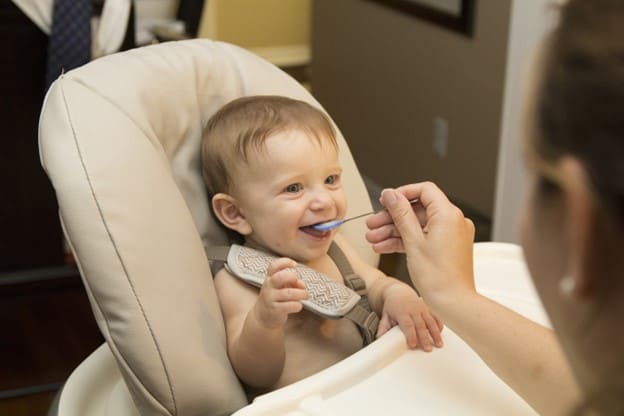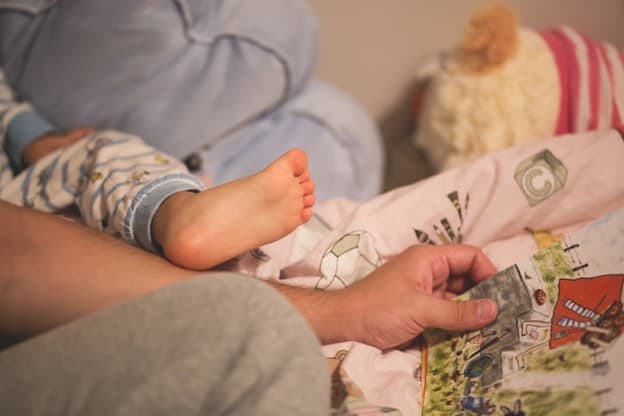As a new parent, you probably want to know everything your child does. Every accomplishment, from their first grin to their first steps, is worthwhile celebrating. Dealing with nighttime pooping, though, might not be all that exciting. Many parents are curious as to when their baby stops pooping at night and be able to get a full night’s sleep.
Newborns typically poop several times a day, and some may even poop during the night. As they grow, their digestive system becomes more mature, and they start to develop a regular bowel movement pattern.
Parents who wish to know when their baby stops pooping at night should ease their worries because nighttime pooping is completely normal. However, it’s valid to feel exhausted from getting up in the middle of the night to change diapers. There are a few things you can do if you’re trying to help your kid stop pooping at night.
When Do Babies Stop Pooping at Night?

When babies stop pooping at night can vary depending on their age and digestive system development. Babies typically begin to have fewer nighttime bowel movements between the ages of six weeks to three months, which can be a pleasant reprieve for exhausted parents. Some infants may poop once daily or every other day by the time they are three months old.
It’s crucial to keep in mind, though, that some infants may poop at night even after three months. Based on their developmental patterns, babies’ bowel motions can vary from one to the next in frequency.
A baby’s diet can influence their bowel motions in addition to their age and developmental stage. Compared to formula-fed newborns, who may have stiffer, less frequent stools, breastfed babies often have softer, more frequent stools. When solid foods are introduced to a baby’s diet, changes in bowel habits, such as constipation, may result. These changes may affect when babies stop pooping at night.
Factors that Affect Night-Time Pooping
Diet

A child’s bowel movements might be considerably affected by what they eat over the day. Fruits and vegetables, which are high in fiber, can encourage regular bowel movements, but oily, fatty, or sugary diets might irritate the digestive system. Eating too soon before bed can also stimulate the digestive system, increasing the likelihood of waking up in the middle of the night to use the restroom.
Fluid Intake
For effective digestion and bowel movement, it’s imperative to stay adequately hydrated. However, consuming too much water before bed can result in more nighttime bathroom visits. It can be beneficial to encourage kids to drink lots of fluids early in the day and to reduce intake before night.
Toilet Training
A child who’s still learning to use the toilet may not yet be able to recognize when they need to go. Accidents, including nighttime pooping, could arise as a result. Establishing a pattern and reducing accidents can be accomplished by consistently reinforcing toilet training before night and during the day.
Medical Conditions
Nighttime pooping can be brought on by a number of conditions, including food sensitivities, irritable bowel syndrome, and constipation. A child who frequently poops at night may have a medical condition that has to be treated by a medical professional.
Anxiety and Stress
A child’s digestive system may be impacted by stress and worry, resulting in nighttime pooping. This issue can be resolved by locating and treating the source of any tension or anxiety. A relaxing sleep routine can aid in promoting relaxation and reducing stress.
How to Help Baby Outgrow Night-Time Pooping

Establishing a regular bedtime schedule is one approach to assist your infant in growing out of nighttime pooping. This practice can assist in letting your child know when it’s time to go to bed and in controlling their bowel movements. Make sure your infant is full before bedtime to lessen the possibility that they’ll wake up hungry and in need of a diaper change.
Another method is to wean your infant gradually from nighttime feedings. Increase the amount of milk your baby drinks during the day gradually to make them less hungry at night if they get up in the middle of the night to eat. In order to increase the likelihood that they’ll sleep through the night, you can also move the final feeding of the day closer to bedtime.
If your baby is eating solids, you might want to adjust their diet. Feeding certain items, such as fruits and vegetables, earlier in the day may help decrease the risk of nighttime pooping. These foods are known to stimulate bowel movements.
Maintaining a clean and dry diaper region for your child is crucial, especially if they’re prone to diaper rash. To reduce the number of times you need to change an infant’s diaper during the night, consider using more absorbent overnight diapers.
Keep in mind that each child is unique, so what works for one baby might not work for another. Till you discover a method that works best for you and your infant, be patient and test out various approaches. Your kid will eventually stop pooping at night, allowing you both to obtain a restful night’s sleep.
When to Worry

One typical source of concern is if the child has diarrhea or loose stool at night. Dehydration brought on by diarrhea can be hazardous for young children. Keep an eye on your child’s fluid intake if they have diarrhea, and if their symptoms don’t improve, call your doctor.
The presence of pain or discomfort during your child’s nighttime bowel movements is another reason to be concerned. This symptom may indicate a more significant underlying issue, such as food allergies, constipation, or irritable bowel syndrome. To rule out any major health issues, you must speak with your child’s pediatrician if they routinely complain of pain or discomfort during their nightly bowel movements.
It’s important to note that some babies simply have more bowel movements on average than others. There might be nothing to worry about if your child is otherwise healthy and showing no other symptoms. However, don’t be afraid to ask your pediatrician for advice if you’re uncertain, have any questions, or are concerned about your child’s nighttime pooping.
Final Thoughts
When babies stop pooping at night depends on several factors, such as the baby’s diet and the development of their digestive system. Keep in mind that nighttime pooping is a typical developmental stage for babies. Over time, your child will outgrow the need for those nighttime diaper changes.
Being aware of the different factors that contribute to your baby’s bowel movements can help you adjust their diet and routine accordingly. It’s also crucial to follow your instincts as a parent and seek your pediatrician’s advice if you suspect digestive problems.